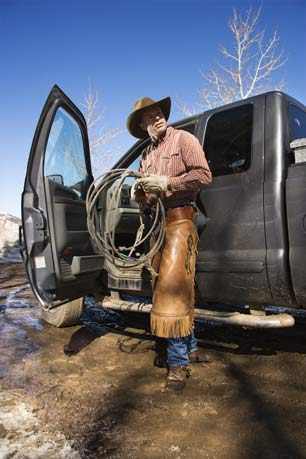Honest, paywall-free news is rare. Please support our boldly independent journalism with a donation of any size.
 Super PACs created during the final days of an election, such as the “farcical” Trucks for Cowboys Super PAC, can take advantage of a quirk in campaign finance law to hide their funders until after the election. (Image: Cowboy truck via Shutterstock)Super PACs must, by law, publicly reveal their donors.
Super PACs created during the final days of an election, such as the “farcical” Trucks for Cowboys Super PAC, can take advantage of a quirk in campaign finance law to hide their funders until after the election. (Image: Cowboy truck via Shutterstock)Super PACs must, by law, publicly reveal their donors.
Except, that is, for those that materialize during the final days of the 2014 midterm election.
Thanks to a contentious quirk in federal law, at least six new super PACs may hide their funders from public scrutiny until early December, no matter how much money they raise or spend from now until Election Day on Nov. 4.
Why? Federal campaign finance reporting regulations state that various political committees must file this week “pre-election” financial diclosures that cover activity through Oct. 15. Any political committee that forms after Oct. 15 gets a free non-disclosure pass for up to seven weeks.
Charles Philipp, a New York City media professional who created the Trucks for Cowboys Super PAC on Thursday, says he’s well aware that his committee need not disclose its funders until after Thanksgiving.
That’s part of the point of forming what Philipp described as a “farcical” super PAC that’s “a way for me to make fun of the system.”
Philipp explained his super PAC will support candidates who, as its name suggests, support cowboys driving trucks over, say, electric vehicles.
“I’m creating this in the vein of a single-issue super PAC that a special interest may create,” Philipp said.
He added, however, that his fundraising efforts are sincere, and that he’ll potentially spend money during the 2014 election if he can raise it.
A pair of other pop-up super PACs — Bergen Cares and Port Prosperity — may have a less satirical purpose.
Their chairmen, respectively, are Abner Bonilla, a New Jersey-based political consultant at firm Arkady — clients include Sen. Cory Booker, D-N.J. — and Daniel J. McCarthy, a Cranford, New Jersey, lawyer with ties to Democratic politicians. The PACs share an official address — a mailbox at a UPS Store along Pennsylvania Avenue in Washington, D.C.
The creator and treasurer for both PACs is Gianni Donates of Harrison, New Jersey. Reached by phone Monday, Donates declined to comment on what the super PACs intend to do, saying he “had a meeting” and would call back. Since then, he could not be reached for comment.
Meanwhile, a New Jersey-based super PAC called Hip Hop United, which officially formed Oct. 16, states in its federal filing that it aims to “run advertisements for or against candidates and/or support issues relevant to the Hip Hop Community” and “use Hip Hop style mediums and entertainment functions to uplift, empower and educate citizens.”
Other super PACs that have formed since Oct. 15 include the Kansas Ag Communities Coalition of Topeka, Kansas, and Constitutional Veterans for Freedom Super PAC of Wilmer, Texas.
Futhermore, a South Dakota-based super PAC calling itself Many True Conservatives sprung into existence on Oct. 15, meaning that it, too, may temporarily hide any donations it receives, save for those obtained on its creation day.
Its founder is listed as Gary Coe, who bills himself on his LinkedIn profile as a pilot and owner of Resource Maxima, a company that markets dietary supplements and health creams.
As of today, none of the nascent super PACs have spent any money to advocates for or against a federal political candidate — activity that federal law does require them to report, usually within 24 hours of making such an expenditure.
That certain super PACs may hide their donors during the final weeks of a major election, when the control of Congress is at stake, is “damaging” and undermines the core of our campaign laws and our elections,” said Larry Noble, a former Federal Election Commission general counsel who now advises election law reform group Campaign Legal Center.
The FEC, Noble said, should change its regulations and compel super PACs to reveal their donors regardless of when they form.
But Dave Mason, a former FEC chairman and current senior vice president of compliance at campaign consulting firm Aristotle, disagrees. He argues that Congress would need to pass a law requiring late-filing super PACs to disclosue donors before Election Day.
In the meantime, he notes, super PAC creators are “simply following the law” as written and doing nothing wrong.
<!— Place with body copy. Can go at bottom if story is not paginated. If story is paginated, please put on every page. —>
Trump is silencing political dissent. We appeal for your support.
Progressive nonprofits are the latest target caught in Trump’s crosshairs. With the aim of eliminating political opposition, Trump and his sycophants are working to curb government funding, constrain private foundations, and even cut tax-exempt status from organizations he dislikes.
We’re concerned, because Truthout is not immune to such bad-faith attacks.
We can only resist Trump’s attacks by cultivating a strong base of support. The right-wing mediasphere is funded comfortably by billionaire owners and venture capitalist philanthropists. At Truthout, we have you.
Truthout has launched a fundraiser to raise $34,000 in the next 5 days. Please take a meaningful action in the fight against authoritarianism: make a one-time or monthly donation to Truthout. If you have the means, please dig deep.
